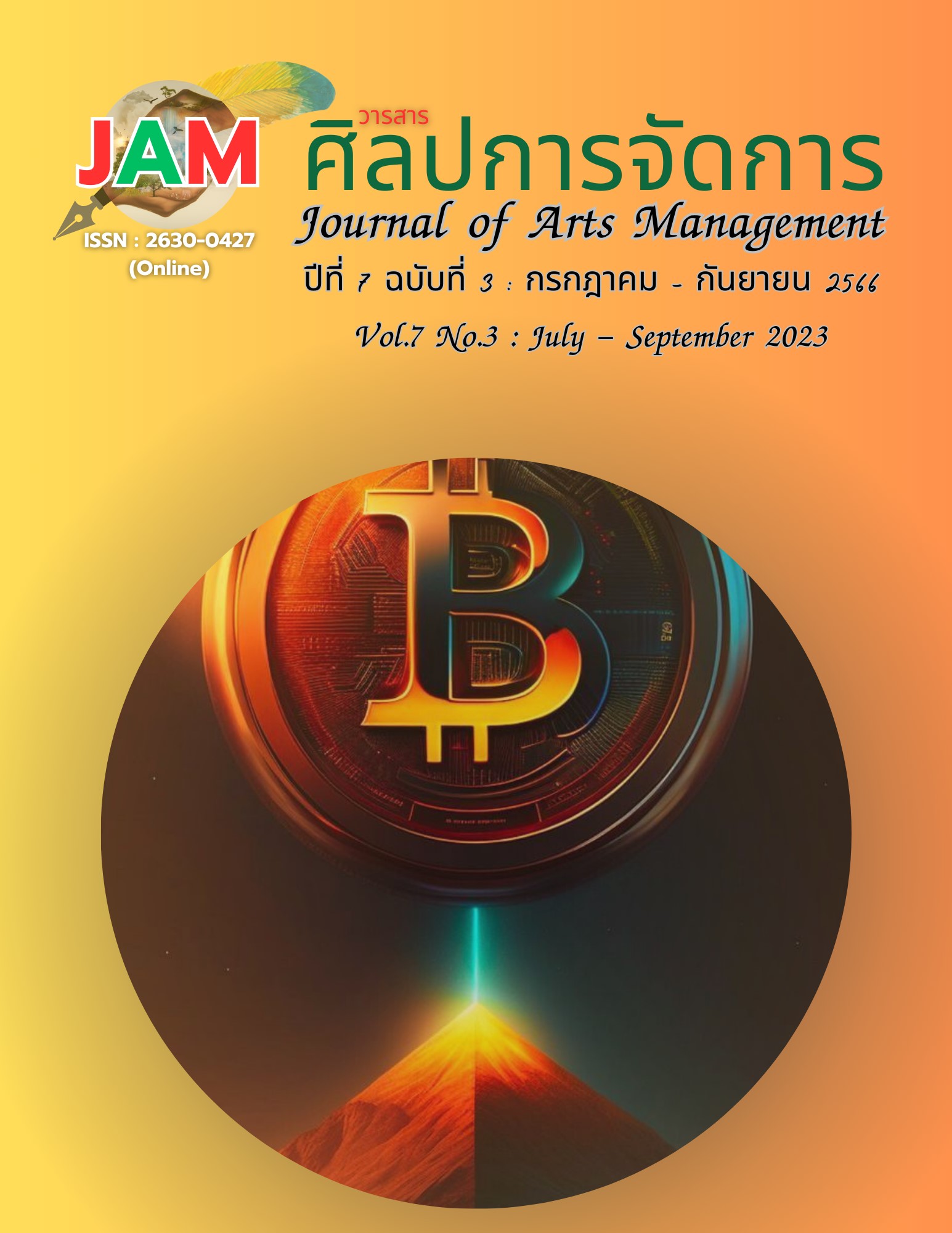Knowledge Management of Local Intellectual Knowledge in Herbal Product Processing of Moringa Seed Oil at Herbal Community of Bangbon, According to the Sufficiency Economy Philosophy towards Pracharat Market
Main Article Content
Abstract
These research objectives were: 1. to study the context and potential product development obtained from the local wisdom community in Bang Bon Herbal Group according to the royal initiatives of sufficiency economy for the Pracharat market project; 2. to investigate the development pattern of herbal products made from Moringa oil in Bang Bon Herbal Group according to the royal initiatives of sufficiency economy for the Pracharat market; and 3. to strengthen the community in converting community products of Moringa oil to the Pracharat market in response. The methods used in this study were quantitative and qualitative. The sample groups in the study were people living in Bang Bon district, Bangkok. The overall sample consisted of 70 participants obtained from convenient sampling. The instrument used in this study was a questionnaire concerning the local wisdom and knowledge management of Moringa herbs. Descriptive statistics, such as percentage, average, and standard deviation, were used to analyze the data. The results showed that knowledge management in the local wisdom of Moringa herbs was managed based on the patronage system. When categorizing the types of knowledge management, the results reported the highest knowledge management obtained from family beliefs. The pattern of product development made from Moringa herbs was most frequently transferred from one generation to another. When considering other items, mostly the local wisdom knowledge was transferred to their children. In addition to strengthening the community by introducing Moringa oil products to the Pracharat market, the results showed that people produced Moringa oil products at a moderate level on the online platform at the highest level.
Article Details

This work is licensed under a Creative Commons Attribution-NonCommercial-NoDerivatives 4.0 International License.
Views and opinions appearing in articles in the Journal of Arts of Management It is the responsibility of the author of the article. and does not constitute the view and responsibility of the editorial team I agree that the article is copyright of the Arts and Management Journal.
References
Chalakanjana, P., Maimun, T., Pakham, S., Caomoon, A. (2022). Guidelines for the Development of Processed Herbal Products of Ban Hua Fai Community Enterprise Group, Huai Sai Subdistrict, Chiang Mai. Khuang Phaya Journal, 16(2), 26-36. https://so06.tci-thaijo.org /index.php/khuangpaya/article/view/259395/174926
Charoensook, S. (2004.) Adaptation of Marketing Strategy for Thai Tradition Retailing[Master’s Thesis, Sripatum University]. http://dspace.spu.ac.th/handle/123456789/252?locale=th
Chaturongkul, A. (2000). Consumer Behavior. (2nd ed.). Thammasat University.
Department of Development of Thai Traditional and Alternative Medicine, Ministry of Public Health. (2013). Good Health Starts Here. National Buddhism Office Printing House.
Iranoppaiboon, N. (2021). Satisfaction of construction contractors towards marketing mix of Ready-Mixed concrete of CPAC Franchisees Chom Thong Branch[Master’s Thesis, Chaimai University]. http://cmuir.cmu.ac.th/handle/6653943832/10083
Jitakamthai, S. (2007, March 26). United Nations and "Sufficiency Economy" of "King". Matichon Newspaper, 30(10607).
Jiwju. N., Siboonnun, T., Sirikitsathian, C., & Jangmo, W. (2017). The Development of Processing Herbs Based on Local Intelligence from the Variety of Biodiversity Resources to Improve Community’s Economy: The Case Study of Bhan Phopattana, Tambon Khonthi, Amphoe Mueang, Kamphaeng Phet Province. Phranakhon Rajabhat Research Journal Department of Humanities and Social Sciences, 11, 83-93.
Office of the Royal Development Projects Board (ORDPB). (2013). Philosophy of “Sufficiency Economy”. http://km.rdpb.go.th/Knowledge/View/52)
Pringpuangkaew, S. (1995). Folk medicine in Globalization in the Institute of Thai Traditional Medicine, Department of Medical Services, Ministry of Public Health. Seminar on Thai Traditional Medicine and Thai Society. Ror. Sor. Por. Printing House.
Puangngam, K. (2019). Self-management of Communities and Localities. Thammasarn.
Royal Thai Army Radio and Television, TV5 HD. (2021, June 5). The program to reform the herbal group based on the Sufficiency Economy Philosophy. Ang Thong Province. Woodburry Media Group.
Sangsuwan, T. et al. (2009). Marketing Management. (10th ed). Pearson Education, Indo-China.
Sophimai, B. (2007). A study on people's participation in local development. A case study of Nai Mueang Subdistrict Administrative Organization, Phimai District, Nakhon Ratchasima Province[Master’s Thesis, Khon Kaen University].
Triped, J., Pattra, S., & Mahamit, W. (2021). Study of Folk Wisdom Wage of Local Herbal Plants along the Ecological Environment of Phrom River, Chaiyaphum Province. Faculty of Arts and Science, Chaiyaphum Rajabhat University. Journal of Local Governance and Innovation, 5(1), 213-223.
Yoadsomsuay, P. (2013). A study of Wisdom of Folk Doctor in Ampur Ounkharuk, Nakhornnayok Province. Thammasat Medical Journal, 13(2), 212-217. https://he02.tci-thaijo.org/index.php/tmj/article/view/13704
Yukong, C., & Chonpracha, S. (2023). Development of Herbal Products Based on Wisdom Knowledge and Local Identity Plants of Wat Ku Tao Virtuous Herbal Community Enterprise, Mae Thom Subdistrict, Bang Klam District, Songkhla Province. The Journal of Research and Academics, 6(3), 201-213. https://so06.tci-thaijo.org/index.php/jra/article/view/260036/176896


